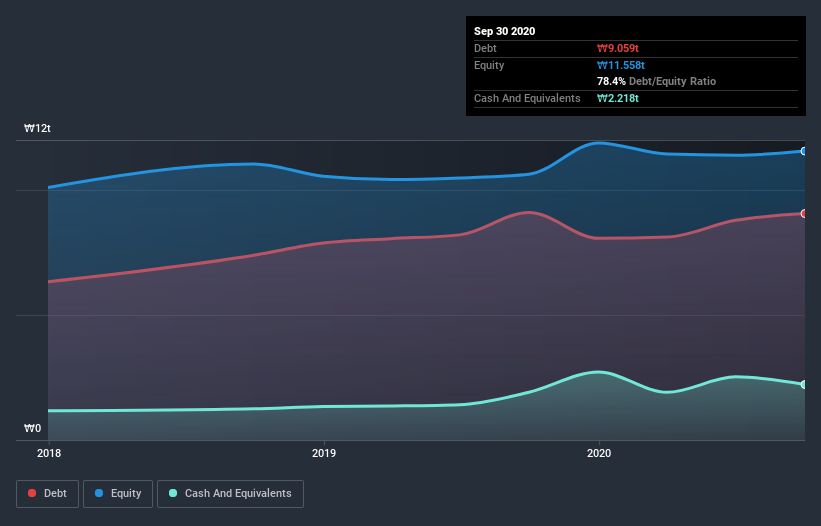- South Korea
- /
- Oil and Gas
- /
- KOSE:A267250
Is Hyundai Heavy Industries Holdings (KRX:267250) Using Debt Sensibly?

Legendary fund manager Li Lu (who Charlie Munger backed) once said, 'The biggest investment risk is not the volatility of prices, but whether you will suffer a permanent loss of capital.' When we think about how risky a company is, we always like to look at its use of debt, since debt overload can lead to ruin. We can see that Hyundai Heavy Industries Holdings Co., Ltd. (KRX:267250) does use debt in its business. But is this debt a concern to shareholders?
Why Does Debt Bring Risk?
Debt assists a business until the business has trouble paying it off, either with new capital or with free cash flow. Ultimately, if the company can't fulfill its legal obligations to repay debt, shareholders could walk away with nothing. While that is not too common, we often do see indebted companies permanently diluting shareholders because lenders force them to raise capital at a distressed price. Of course, debt can be an important tool in businesses, particularly capital heavy businesses. When we think about a company's use of debt, we first look at cash and debt together.
See our latest analysis for Hyundai Heavy Industries Holdings
What Is Hyundai Heavy Industries Holdings's Debt?
As you can see below, Hyundai Heavy Industries Holdings had ₩9.06t of debt, at September 2020, which is about the same as the year before. You can click the chart for greater detail. However, it does have ₩2.22t in cash offsetting this, leading to net debt of about ₩6.84t.

How Strong Is Hyundai Heavy Industries Holdings' Balance Sheet?
We can see from the most recent balance sheet that Hyundai Heavy Industries Holdings had liabilities of ₩6.79t falling due within a year, and liabilities of ₩8.04t due beyond that. On the other hand, it had cash of ₩2.22t and ₩2.40t worth of receivables due within a year. So its liabilities total ₩10t more than the combination of its cash and short-term receivables.
The deficiency here weighs heavily on the ₩3.40t company itself, as if a child were struggling under the weight of an enormous back-pack full of books, his sports gear, and a trumpet. So we definitely think shareholders need to watch this one closely. After all, Hyundai Heavy Industries Holdings would likely require a major re-capitalisation if it had to pay its creditors today. The balance sheet is clearly the area to focus on when you are analysing debt. But ultimately the future profitability of the business will decide if Hyundai Heavy Industries Holdings can strengthen its balance sheet over time. So if you're focused on the future you can check out this free report showing analyst profit forecasts.
Over 12 months, Hyundai Heavy Industries Holdings made a loss at the EBIT level, and saw its revenue drop to ₩21t, which is a fall of 23%. To be frank that doesn't bode well.
Caveat Emptor
While Hyundai Heavy Industries Holdings's falling revenue is about as heartwarming as a wet blanket, arguably its earnings before interest and tax (EBIT) loss is even less appealing. To be specific the EBIT loss came in at ₩196b. Combining this information with the significant liabilities we already touched on makes us very hesitant about this stock, to say the least. Of course, it may be able to improve its situation with a bit of luck and good execution. But we think that is unlikely, given it is low on liquid assets, and burned through ₩962b in the last year. So we consider this a high risk stock and we wouldn't be at all surprised if the company asks shareholders for money before long. There's no doubt that we learn most about debt from the balance sheet. However, not all investment risk resides within the balance sheet - far from it. For example, we've discovered 3 warning signs for Hyundai Heavy Industries Holdings (1 can't be ignored!) that you should be aware of before investing here.
When all is said and done, sometimes its easier to focus on companies that don't even need debt. Readers can access a list of growth stocks with zero net debt 100% free, right now.
When trading Hyundai Heavy Industries Holdings or any other investment, use the platform considered by many to be the Professional's Gateway to the Worlds Market, Interactive Brokers. You get the lowest-cost* trading on stocks, options, futures, forex, bonds and funds worldwide from a single integrated account. Promoted
Valuation is complex, but we're here to simplify it.
Discover if HD Hyundai might be undervalued or overvalued with our detailed analysis, featuring fair value estimates, potential risks, dividends, insider trades, and its financial condition.
Access Free AnalysisThis article by Simply Wall St is general in nature. It does not constitute a recommendation to buy or sell any stock, and does not take account of your objectives, or your financial situation. We aim to bring you long-term focused analysis driven by fundamental data. Note that our analysis may not factor in the latest price-sensitive company announcements or qualitative material. Simply Wall St has no position in any stocks mentioned.
*Interactive Brokers Rated Lowest Cost Broker by StockBrokers.com Annual Online Review 2020
Have feedback on this article? Concerned about the content? Get in touch with us directly. Alternatively, email editorial-team (at) simplywallst.com.
About KOSE:A267250
HD Hyundai
Through its subsidiaries, engages in oil refining business in Korea and internationally.
Flawless balance sheet with solid track record and pays a dividend.
Market Insights
Community Narratives



